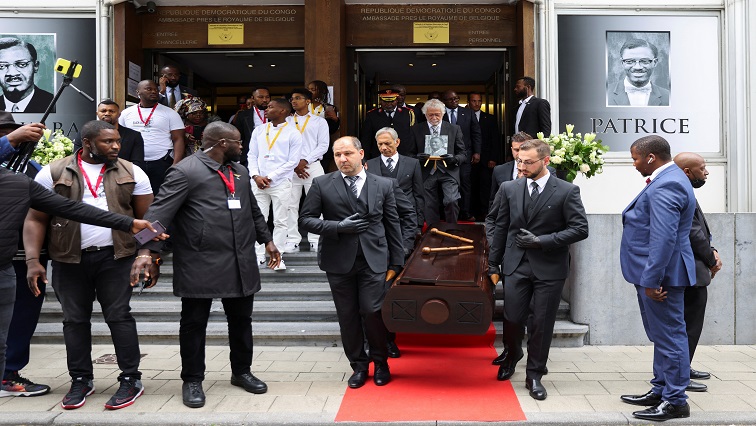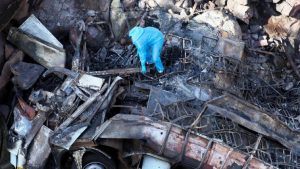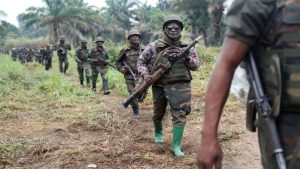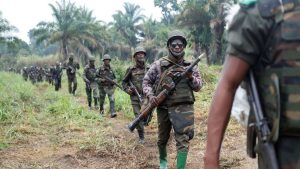The only known remains of Congolese independence leader Patrice Lumumba have been returned to the Democratic Republic of Congo (DRC). The gold-crowned tooth of the executed leader was taken by a Belgian policeman.
Lumumba’s remains arrived in the Democratic Republic of the Congo on Wednesday, more than six decades after his assassination.
The remains will go on tour around the vast country before being buried in the capital, Kinshasa.
Lumumba was the first democratically elected prime minister of the Democratic Republic of Congo. He alarmed the West with overtures to Moscow at the height of the Cold War. His government lasted just three months before he was overthrown and assassinated by a firing squad.
Lumumba supporters and some historians accuse the CIA of having ordered his killing. His body was never found. A Belgian official handed a blue box containing the tooth to members of his family at Egmont Palace in central Brussels on Monday.
“It isn’t normal that Belgians held on to the remains of one of the founding fathers of the Congolese nation for six decades,” Belgian Prime Minister Alexander De Croo said in a speech.
De Croo said Belgian colonial rule was a dark page in Belgium’s history, echoing comments of the Belgian King Philippe during a visit to DRC earlier in June, adding that African people still experienced racism in Belgium today.
‘National hero’
DRC Prime Minister Jean-Michel Sama Lukonde called Lumumba a national hero and said his death and suppression of his supporters hurt not only victims’ families but the country as a whole.
Lumumba’s daughter Juliana, who in 2020 sent a letter to Belgium’s king asking for her father’s remains to be returned, said there was still a lot unknown about the final moments of her father’s life.
“All we know is that you were convicted and unable to defend yourself,” she said in a speech.
A Belgian parliamentary investigation into his killing concluded in 2002 that Belgium was “morally responsible” for Lumumba’s death.
The tooth was reportedly taken from Lumumba’s body by a Belgian policeman, Gerard Soete, who claimed to have dissolved much of Lumumba’s body in acid, and burned the rest.
King Philippe’s visit to DRC
From 1908 to 1960, Belgium ruled the Democratic Republic of the Congo. And for over 25 years, Congo had been a personal colony of Leopold II, Philippe’s great-great-grandfather.
Belgium has partly acknowledged its responsibility for the murder of Lumumba in 1960. But King Baudouin’s complicity remains to be officially recognised. A parliamentary commission found that he was aware of plans to assassinate the Congolese leader.
The commission “tried in a way to limit the damages with its conclusions” and shied away from linking Belgium directly to the assassination. That was because “the diplomatic, ideological and financial consequences would be extremely great.”
During a recent visit to the country, King Philippe of Belgium expressed his “deepest regrets” for the exploitation and oppression of Belgian colonialism. His exhortation to dissipate colonial memories is problematic in Lubumbashi, where Patrice Lumumba was assassinated.
Unanswered questions
Some Congolese are still waiting for answers.
“What are the repercussions of Lumumba’s assassination? What are the conclusions? We don’t know and Lumumba was not murdered alone, there were two more people. Where are their bodies? We don’t know. The Congolese diplomacy did not do a good job, if they had done a good job, we would see the return of Lumumba’s remains as well as the judicial consequences of the act of Lumumba’s murder. I don’t think the Congolese diplomacy did a good job on this point,” said Franck Bunyungu, a resident in Kinshasa.
A DNA test of the tooth would give Soete’s account greater credibility. But the court has not approved a test because it would have destroyed the tooth, leaving nothing to give the family, the spokesman said.
Despite some scepticism, some are looking forward to seeing the remains of Congo’s independence hero.
“It’s been over 60 years and for us, the younger generation, it’s a happy moment to see the remains of Lumumba finally coming back to the land of its ancestors. These things are appreciated, it also shows the government in place is doing its job. Can you imagine since the killing of Lumumba even his own family was never able to see the body? But now we will be able to see his tooth, it’s a feeling of joy,” said David Ilunga, who lives in Kinshasa.
Bruxelles-Kinshasa relations
The commission’s purpose was to lay the groundwork for a reorientation of international relations with former colonial territories.
When it comes to the restitution of objects from colonial contexts, the Belgian government has allocated 2 million euros (about US$2.1 million) to research the provenance of the objects.
For many Congolese in the diaspora in Belgium and in the Congo, this doesn’t go far enough. They also demand an official apology for the colonial atrocities. The government and the king have so far only formulated a ‘regret’.
For relations to truly improve, the Belgian state must acknowledge its historical responsibility more strongly. It must negotiate politically on an equal footing with its former colonies.
Reparations are also an important issue. Even if many Belgians believe that they cannot be held responsible for the crimes of their ancestors, the Belgian economy profited greatly from colonial exploitation – and in principle continues to do so today.
Every year on June 30th, the Democratic Republic of the Congo celebrates Independence Day. -Additional reporting by Reuters






